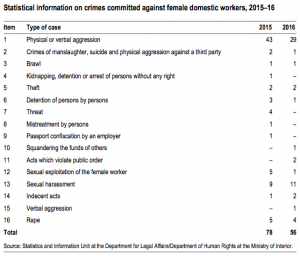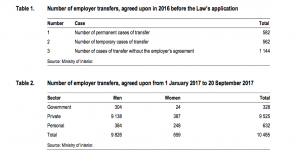Threat of Commission of Inquiry eases
Qatar and the International Labour Organisation (ILO) are set to enter into a three-year programme of Technical Cooperation to carry out extensive labour reforms.
The details of the cooperation were published on October 26, 2017, the day the ILO Governing Body commenced its 331st session. On November 8, a plenary session will follow up on complaints concerning Qatar’s non-observance of the Forced Labour Convention and the Labour Inspection Convention, and determine if a Commision of Inquiry will be launched.
An excerpt from the report published by the ILO outlines terms of the cooperation:
The programme will support the implementation of numerous measures to address passport confiscation, contract substitution, as well as restrictions on migrant workers’ ability to change employer and exit the country.
-
Restrictions on migrant workers’ ability to exit the country subsequent to a reasonable notice period will be removed.
-
The Wage Protection System (WPS) will continue to be improved to ensure that workers’ wages are paid on time and that wage arrears are systematically settled. In addition, the Government of Qatar has announced its intention to introduce a minimum wage rate applicable to all workers without any distinction.
-
As part of its efforts to implement a contractual system to replace the kafala system, the Government of Qatar expressed its commitment to undertake the renewal of residence permits directly with migrant workers.
-
The ILO will support migrant workers in submitting complaints to the national mechanisms with a view to ensuring speedy and fair treatment and absence of retaliation.
The ILO technical cooperation programme will report annually to the Governing Body at its November session.
Points 2 and 3 are particularly significant; a minimum wage for all workers without ‘any distinction’, and giving workers the agency to renew their own residence permits will ensure that they are not forced into irregular status, and then victimised for it.
If implemented effectively, this may set an example for reforming other Kafala regimes in the region.
Interestingly, there is no mention of freedom of association, which has been stressed in previous reports by trade unions working with the ILO.
The Qatar government has submitted to the ILO details of:
- New legislative developments (including the new domestic worker law, published by the country in English for the first time),
- The effective application of Law No. 21 of 2015 relating to the entry, exit and residence of migrant workers (the law touted as the replacement of the kafala).
- Further measures taken to follow-up on the assessment of the high-level tripartite delegation.
- The measures taken to engage in a technical cooperation agreement with the ILO.
Domestic Workers
Migrant-Rights.org earlier published an analysis of the Domestic Workers Law based on the information made available by local media.
Of particular note is the provision in the Law that sets down a maximum 10-hour work day. Working days must include break periods for worship, rest and food, but these periods will not count towards the calculation of working hours.
The law also states that one can employ a domestic worker directly from abroad (without using a recruitment agent) after acquiring necessary approvals.
Two recently signed Memorandums of Understanding (MoUs) indicate that current moratoriums in place in some countries of origin may no longer apply to Qatar:
- A MoU between the National Committee for Human Rights and the National Committee for Human Rights in Nepal
- A MoU between the National Committee for Human Rights and the National Institution for Human Rights in Indonesia;
The Regional Office of the Asia Pacific Forum (APF) was also recently inaugurated at the site of The National Committee for Human Rights in Doha.One of the objectives of this partnership is to ensure joint cooperation with respect to protecting and strengthening the rights of migrant workers, including female domestic workers in Qatar.
Entry and Exit
Qatar says that it has “removed the constraints previously imposed on some migrant workers in changing employers. These involved workers who were granted work permits for specific projects. Now, the Government has not imposed any conditions on transferring to another employer and the worker can move to another employer if the provisions of the Labour Code concerning the notification procedure are respected.”
The report also claims that of the 2,958 grievances received regarding exit permits, only two were rejected. This is a correction of earlier figures (Over 761 were received between December 13, 2016, and February 15, 2017; 213 of which were rejected, 485 approved, and the remaining in consideration at the time.)
This is not the first time that Qatar has made headline-grabbing announcements promising extensive labour reform but fallen short on delivery.
In May 2014, Qatar announced plans to end the Kafala system, and but the reforms came into effect only in December 2015, and did not meet the promises made at the start.
But the Technical Cooperation is a promising move and one that might result in the abolition of the worst provisions of the Kafala. Migrant-Rights.org welcomes this move.







